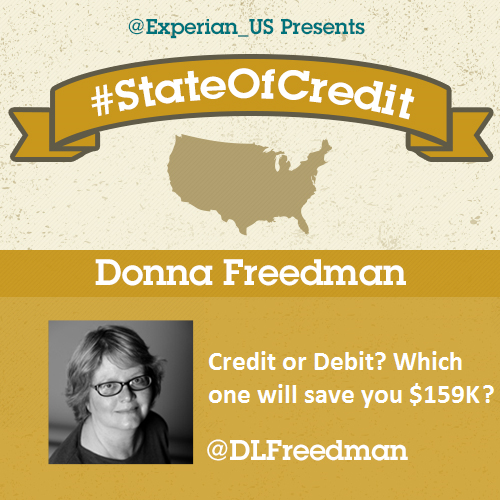This guest post is from Donna Freedman (@DLFreedman). Donna is a former newspaper journalist and staff writer for MSN Money and Get Rich Slowly. Currently she writes for Money Talks News and for her own website, donnafreedman.com.
Bankcard lending is trending upward, according to the 2014 Experian “State of Credit” report. One in 17 consumers obtained at least one bankcard this year, compared with one in 21 people back in 2013.
Consumers now carry an average of 2.18 bankcards apiece (an increase of 4.2 percent), and an average of 1.54 retail cards (a jump of 6.7 percent).
In other words, credit availability is on the rise. Can we do it smarter this time?
The recession left a lot of folks financially bruised. Some had their interest rates raised or their credit limits lowered. Those who couldn’t make even minimum payments were hounded by card issuers; some ultimately walked away, which sent their credit scores south.
Apparently our kids were watching. The number of under-30s without credit cards rose from 9.3 percent in 2005 to 16.1 percent in 2012, as reported by The New York Times.
Choosing debit over credit can keep consumers from running amok: You can’t spend what you don’t have, as opposed to the “free money!” vibe some folks get from credit cards. But debit doesn’t have the same protections as credit and, more to the point, debit doesn’t help your credit history.
There’s good news on that front, too: The national VantageScore® credit score rose two points from 664 to a spooky 666.
Yes, that number just begs for snarky commentary. But unlike some personal finance wonks, I happen to believe that credit is not from the devil.
‘Enormous repercussions’
Quite the contrary: I’m concerned that at least 16 percent of millennials are avoiding credit altogether. Having some plastic in your purse can make a giant difference in your life in ways that have nothing to do with shopping malls.
“Your life is going to be harder and more expensive if you refuse to use credit cards,” says Liz Weston, author of “Your Credit Score, Your Money & What’s at Stake.”
Responsible and sustained use of bank or retail cards has a major impact on your credit score – and a healthy credit score has “enormous repercussions for your wallet, your future and your peace of mind,” she notes.
How enormous? An average of $159,464 in extra interest paid over your lifetime, according to Credit.com’s Lifetime Cost of Debt Calculator.
Lenders use your credit score to determine rates for auto or mortgage loans. As noted above, a less-than-optimal score means you’ll pay more in interest – and it might keep you from borrowing at all. Potential insurers, bosses and landlords may also be looking at that three-digit number.
Plenty of people think the current system is unfair because it penalizes those who choose to pay cash. But like it or not, it’s what we have to work with now.
Avoiding bankcards because you resent the credit scoring system is like avoiding medical care because you think doctors make too much money. The only person you are potentially harming is yourself.
“Unless you plan on writing checks for your cars, houses and tuition, you need the credit system,” says John Ulzheimer, credit expert for CreditSesame.com.
‘Credit’ doesn’t automatically mean ‘debt’
Using cash, debit cards and prepaid debit cards do nothing for your credit history. Debit cards may expose users to fraud and/or theft, especially if they shop online, notes Beverly Harzog, author of “Confessions of a Credit Junkie: Everything You Need to Know to Avoid the Mistakes I Made.”
If your debit card gets hacked the thief could siphon money from your account. “This could cause a cash-flow crisis” until the bank investigates, Harzog says.
Credit cards, on the other hand, “offer excellent consumer protections against fraud.”
Incidentally, credit doesn’t automatically equal debt. Just as you wouldn’t overdraft with your debit, don’t overspend with a bankcard.
Don’t trust yourself not to overbuy? Get a secured card – again, you can’t spend what you don’t have. Or ask to become an authorized user on a parent’s account; if you mess up, Mom or Dad can just drop you from the account.
Use the card for utility bills and for everyday purchases like groceries and gasoline. Pay it off in full each month and your score will grow. (Tip: A blogger I know makes a payment every Friday, just to be on the safe side.)
“The idea that credit cards are synonymous with debt needs to be smashed. People can and do use credit cards for convenience only, paying their balances in full every month,” Weston says. According to the Federal Reserve’s Survey of Consumer Finances, about 40 percent of households don’t carry balances, edging out the 35 percent that do. (One-fourth of U.S. households don’t have credit cards.)
The best available tool
The time to get credit and use it wisely is now, not 10 years from today when you decide you want to buy a house. “Part of a strong credit score is having well-established accounts, and you can’t get those overnight,” says Gerri Detweiler, director of consumer education for Credit.com.
Wait too long and you’ll overpay, maybe wildly, for things you want or need. A low-score/no-score situation could also wind up affecting where you live or work.
If nothing else, think of the opportunity cost of that $159,464 in extra interest. What could that money do for you in terms of investing, retirement planning, homeownership or helping your kids through college?
Full disclosure: I am rabidly anti-debt. But I’m also rabidly against shooting yourself in the financial foot. It just makes sense to make wise use of the best tool available to strengthen your credit score.
Put another way: You can use a hammer to bash your thumb, or to build something lasting. Ditto credit. It’s in the way that you use it.
